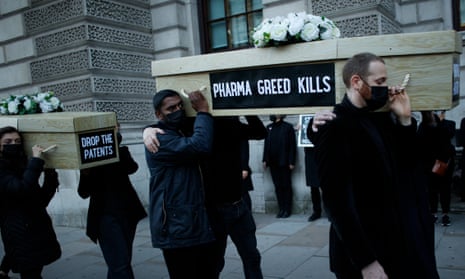Last week, a commission set up by Stanford University and the Lancet found that the devastating opioid crisis in North America could happen again, and not just there. The unethical practices that Patrick Radden Keefe documented in his prize-winning 2021 book, Empire of Pain, were not restricted to one company, Purdue Pharma, and the part of the Sackler family that owned it. They were and remain normal behaviour in the pharmaceutical industry and in the agencies that are supposed to regulate it.
The Covid pandemic has, in some senses, been big pharma’s redemption. The vaccines that were developed at record speed, albeit on the back of decades of painstaking, publicly funded research, have been portrayed as a miracle of public-private cooperation. But this report reminds us that the question of trust isn’t going away – and it won’t until we do something about it.
At a Lancet webinar last week, the addiction expert at Stanford, Keith Humphreys, who led the commission, noted that if you measure the opioid crisis in terms of years of life lost, rather than absolute numbers of deaths, the fallout in the US and Canada has been on a par with that of Covid. Measure it by deaths relative to the populations of those countries, and it’s worse than the HIV/Aids epidemic at its North American peak. This “epidemic” was caused not by a virus, but by human greed. And it’s not over.
Because those who became addicted to prescription painkillers often progressed to heroin and then fentanyl, the crisis is still growing despite tighter controls on prescription. The commission’s modelling suggests that without major policy changes, the US alone could lose another million lives before this decade is out. That’s not to mention the damage that addiction does even when it doesn’t end in death.
What’s more, the crisis is spreading as companies cast their marketing nets wider – notably, to low- and middle-income countries where appropriate pain relief and palliative care are often in short supply. Rich countries aren’t immune either. GP prescriptions for opioids more than doubled in the UK between 1998 and 2018, prompting some to claim that the country was seeing its own opioid epidemic.
Humphreys laid the blame at the door of the opioid manufacturers, of which Purdue was only one. But he also described the culture that enabled them, pointing to “dramatic failures in regulation, in law, by healthcare systems and by individual physicians that failed to stop them”. And most of those weaknesses, he said, have not been fixed.
They include a “revolving door” between industry and the agencies that regulate them; drug companies’ relative freedoms in countries to aggressively market their products; the existence of fake grassroots or “astroturf” groups that claim to represent patients’ interests but are actually in companies’ pay; and the industry’s well-funded lobbying of elected officials.
Although the regulatory environments are different in Europe and the US, we know from at least 20 years of whistleblowing and investigative journalism that the problems the commission identified exist across the industry. In 2012, for example, GlaxoSmithKline was fined $3bn for promoting the inappropriate prescription of antidepressants to children. And last year, the French drugmaker Laboratoires Servier and the French medicines agency were fined for their part in the scandal over Mediator, a diabetes treatment that has been linked to hundreds of deaths.
These cases will be familiar to those who follow drug industry shenanigans. What is interesting is the timing of the Stanford-Lancet report. It was released while we’re still living through a pandemic that has revealed unexpectedly high levels of mistrust in science. People who are vaccine hesitant often point to what they perceive to be the pharmaceutical industry’s untrustworthiness. Yet mainstream opinion absolves the industry of any responsibility for that. For the vaccine-compliant, the only bogeymen in this story – besides a handful of cynical anti-vaxxers – are the social media platforms that peddle disinformation.
A week ago, for instance, the international non-profit NGO, the Center for Countering Digital Hate, wrote, “The simple fact is that the anti-vaxx movement – and its myriad offshoots – have gained public attention and traction for one main reason: because big tech profits from their content and their followers, and so refuses to take them down.”
Let me be clear: the Covid vaccines deserve our trust. More than 10bn doses have been administered to date, and they have turned out to be safer and more effective than anyone dreamed possible. They are our best way out of this pandemic, and the more people who take them, the more lives will be saved. It is also worth pointing out that, even if Covid has created some vaccine billionnaires, vaccine development is not generally lucrative. Until Covid, big pharma was deserting the field because the profit margins were so slight – with the result that we still lack vaccines for some major killers, including HIV.
But even if the industry pulled off a coup this time, in collaboration with academia, it needs to get its house in order or we risk seeing even higher levels of vaccine hesitancy in the next pandemic. After all, many people put their trust in opioids, and that didn’t work out so well. Some companies developing Covid vaccines, such as AstraZeneca, Pfizer and Johnson & Johnson, have been censured for bad practices in the past. Is it really surprising that surveys show it is the least trusted industry?
It is true social media has done us a disservice and our social contract was fraying before Covid came along. But it’s also true that, if anti-vaxxers and their enablers are ready to stop at nothing in pursuit of fat profits, they have an excellent role model in big pharma. If governments, industry and physicians acknowledge this needs to change, at long last, then this crisis won’t have gone to waste.
Laura Spinney is a science journalist and the author of Pale Rider: The Spanish Flu of 1918 and How it Changed the World
